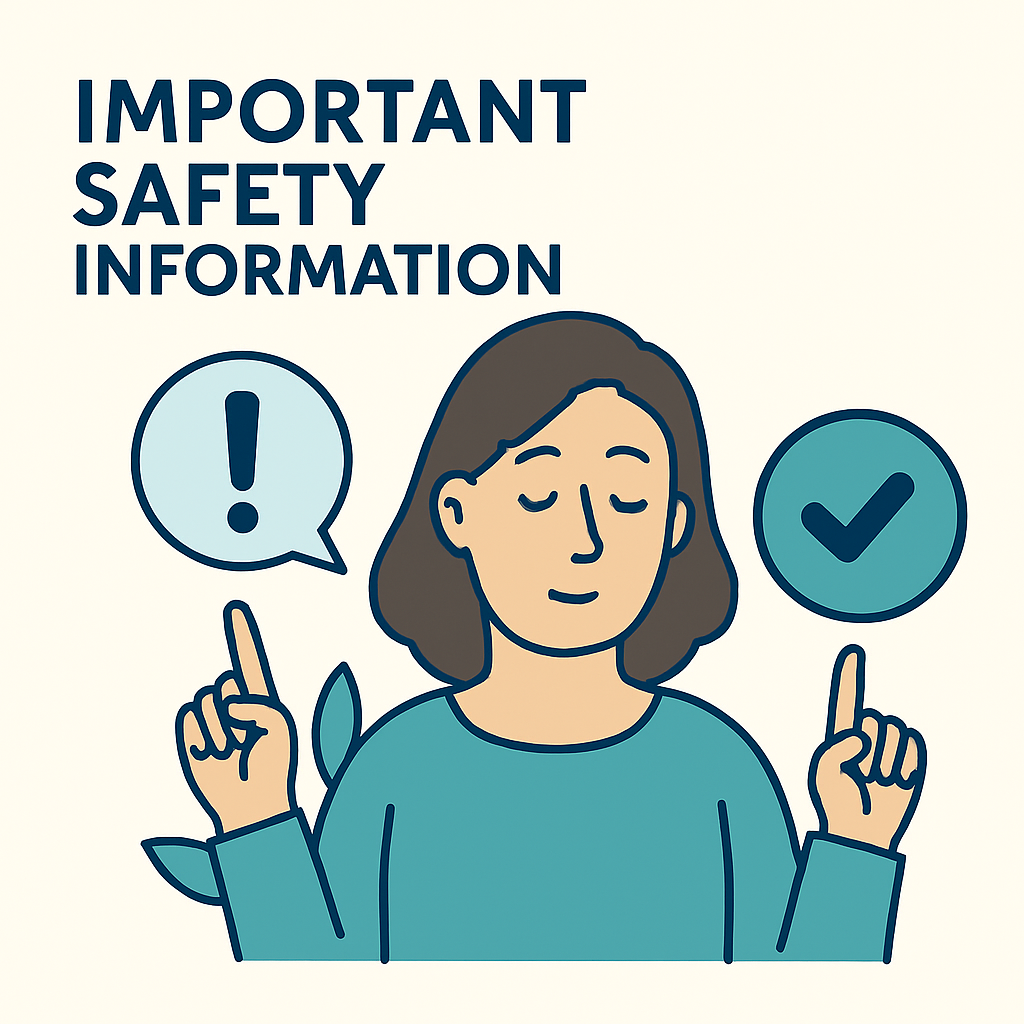

Important Safety Information: GLP-1 Medications
GLP-1 receptor agonists such as semaglutide (brand name Wegovy®) and tirzepatide (brand name Zepbound®) are prescription medications for chronic weight management. These medications can be effective for weight loss when used with diet and exercise, but they may carry significant risks and side effects. Please read this safety information carefully and talk to your healthcare provider if you have any questions or concerns about these treatments.
Who Should Not Use Semaglutide or Tirzepatide
Personal or Family History of Certain Thyroid Tumors:
Do not use semaglutide or tirzepatide if you or any family member has ever had medullary thyroid carcinoma (MTC), a rare thyroid cancer, or if you have Multiple Endocrine Neoplasia syndrome type 2 (MEN2). These conditions are specifically contraindicated because of the thyroid tumor risk (see Boxed Warning below).
Pregnancy:
Do not use GLP-1 medications if you are pregnant or planning to become pregnant in the near future. Wegovy’s labeling warns it may harm an unborn baby, and you should stop the medication at least 2 months before a planned pregnancy. Weight loss offers no benefit during pregnancy, and these drugs have not been adequately studied in pregnant women. If you become pregnant while on treatment, inform your provider immediately.
Breastfeeding:
It is not known if these medications pass into breast milk. If you are nursing, discuss with your provider whether you should use these medications.
Allergies:
Do not use if you have had a serious allergic reaction to semaglutide, tirzepatide, or any of their ingredients. Signs of a serious reaction can include swelling of the face or throat, difficulty breathing, rash, rapid heartbeat, or dizziness. Seek emergency medical help if you experience any allergy symptoms.
Certain Medical Conditions:
Inform your provider about all medical conditions before starting treatment. In particular, tell them if you:
Have or have had problems with your pancreas or kidneys. (It is not known if these drugs are safe in those with a history of pancreatitis, and kidney issues can be worsened by dehydration from side effects.)
Have severe digestive problems such as gastroparesis (slowed stomach emptying) or trouble swallowing. Use of GLP-1 agonists has been associated with gastrointestinal reactions, sometimes severe, and has not been studied in patients with serious GI diseases, so it is not recommended in such cases.
Have type 1 diabetes. (GLP-1 medications are not a substitute for insulin in type 1 diabetes and are not indicated for this condition.)
Have type 2 diabetes with diabetic eye disease (diabetic retinopathy). Semaglutide in diabetics has been associated with diabetic retinopathy complications, so extra monitoring may be needed.
Have a history of depression, suicidal thoughts, or other mental health issues. Weight-loss trials with these drugs have reported rare instances of suicidal ideation; you and your provider should monitor for mood changes.
Are scheduled for surgery or sedation. Because these medicines delay stomach emptying, there is an increased risk of food or liquid getting into your lungs while under anesthesia or deep sedation. Inform your surgeon or anesthesiologist that you are on this medication ahead of the procedure. You may need to stop using your GLP-1 medication 7-10 days in advance of your procedure.
Always discuss your full medical history with our Lavender Sky Health provider so they can determine if a GLP-1 medication is safe and appropriate for you. These medications are not right for everyone and are used only after careful screening.
Boxed Warning: Risk of Thyroid C-Cell Tumors
Both Wegovy® (semaglutide) and Zepbound® (tirzepatide) come with a boxed warning – the FDA’s strongest warning – about a risk of thyroid C-cell tumors. This warning is based on animal studies: in rodents, semaglutide and tirzepatide caused thyroid C-cell tumors, including medullary thyroid carcinoma (MTC). It is unknown if these drugs cause thyroid tumors in humans, but out of caution, patients with a personal or family history of MTC or MEN2 must not use them.
What this means for you:
While thyroid cancer from these medications has not been seen in human studies, you should still be aware of the symptoms of thyroid tumors. Tell your doctor right away if you notice any lump or swelling in your neck, hoarseness, difficulty swallowing, or shortness of breath, as these could be signs of thyroid cancer.
Our providers will also counsel you on this risk and the symptoms to watch for. This precaution is part of ensuring “fair balance” in understanding the benefits vs. risks of treatment. Remember, this risk is very rare, but it is taken seriously. That’s why we give every patient the official FDA Medication Guides for Zepbound (Tirzepatide) and Weogvy (Semaglutide), which highlight this warning in plain language.
Other Serious Risks and Warnings
Beyond the thyroid tumor warning, GLP-1 medications have other serious potential side effects. It’s important to understand these risks before starting therapy. We’ve summarized the key warnings from the FDA-approved labels:
Pancreatitis (Inflammation of the Pancreas): GLP-1 agonists like semaglutide and tirzepatide have been linked to pancreatitis in some patients. Stop using the medication and contact your healthcare provider immediately if you develop severe abdominal pain (especially if it radiates to your back and does not go away, with or without vomiting). Pancreatitis can be life-threatening. These drugs haven’t been studied in those with a history of pancreatitis, so caution is warranted.
Gallbladder Problems: Rapid weight loss and these medications themselves can increase the risk of gallbladder issues, including gallstones and gallbladder inflammation. Some cases have required surgery. Tell your provider right away if you have symptoms such as upper stomach pain, fever, yellowing of the skin/eyes (jaundice), or clay-colored stools, as these may indicate gallbladder stones or inflammation
Kidney Injury: Severe vomiting, diarrhea, or dehydration from the drug’s side effects can lead to acute kidney injury or worsening of kidney disease. If you have kidney problems already, you must be monitored closely when starting treatment. It’s important to stay hydrated by drinking fluids, especially if experiencing GI side effects, to reduce the risk of dehydration-related kidney issues.
Severe Gastrointestinal Reactions: Nausea and stomach upset are common (see Side Effects below), but in some cases stomach problems can be severe and persistent. If you have continuous or worsening nausea, vomiting, or abdominal pain that affects your ability to eat or stay hydrated, inform your provider. Use of GLP-1 drugs is not recommended in patients with severe GI disorders like gastroparesis.
Low Blood Sugar (Hypoglycemia): By themselves, Wegovy® and Zepbound® usually do not cause low blood sugar in people without diabetes. However, if you have type 2 diabetes and are also on other blood-sugar-lowering drugs (such as insulin or a sulfonylurea), adding a GLP-1 can increase the risk of hypoglycemia. Signs of low blood sugar include shakiness, dizziness, sweating, fast heartbeat, hunger, confusion, or feeling faint. Our providers may adjust doses of other medications and will advise you how to watch for and treat low blood sugar.
Increased Heart Rate: Wegovy® in particular has been observed to increase heart rate while at rest in some patients. Your healthcare provider may check your pulse during treatment. Let them know if you feel your heart racing or pounding for an extended period.
Mental Health (Depression/Suicidal Thoughts): A small number of individuals have reported new or worsening depression, mood changes, or suicidal thoughts while taking medications like semaglutide or tirzepatide (this risk has been noted in weight management trials). Pay attention to your mood during therapy. If you experience feelings of depression, hopelessness, or thoughts of self-harm, contact your healthcare provider right away. We also encourage you to let family or close friends know you are starting this medication so they can help observe any mood changes.
Serious Allergic Reactions: Though uncommon, serious hypersensitivity reactions (such as anaphylaxis or angioedema) have occurred with GLP-1 medications. Seek emergency medical help if you notice symptoms of an allergic reaction, like widespread rash, difficulty breathing, swelling of the face/tongue, or dizziness/fainting. Do not use the medication again if a serious allergy is confirmed.
Surgery and Procedure Precautions: Because these medications slow stomach emptying, tell all your healthcare providers that you are on semaglutide or tirzepatide if you are planning any surgery or medical procedure that requires sedation or anesthesia. You may be instructed to stop the medication temporarily before the procedure to reduce aspiration risk (food/liquid entering the lungs during surgery).
Remember: Always report any concerning side effects immediately. Do not stop the medication before consulting your provider unless you suspect a severe reaction like pancreatitis, allergy, or severe depression – in those cases, discontinue and seek medical advice promptly as noted above. In case of emergency, call 911 (or your local emergency number) or go to the nearest emergency department. Lavender Sky Health is not an urgent or emergency care provider and our email, messages, text, and social channels are not monitored for emergencies.
Common Side Effects
Like many medications, semaglutide and tirzepatide can cause side effects. Most patients will experience some mild-to-moderate side effects when starting therapy, especially gastrointestinal side effects. These are often worse at the beginning and improve as your body adjusts (our providers start at a low dose and gradually increase it to help minimize these effects).
The most common side effects reported (in at least 5% of patients in clinical trials) include:
Gastrointestinal symptoms: Nausea is by far the most common side effect. You may also experience vomiting, diarrhea, or constipation, or general stomach discomfort (indigestion). Eating smaller, low-fat meals and staying hydrated can help manage nausea.
Stomach pain or reflux: Some people get abdominal pain or heartburn/acid reflux.
Headache or Fatigue: You might feel a headache or fatigue (tiredness) when first adjusting to the medication. Dizziness has also been noted in some patients.
Injection site reactions: Because these medications are given as weekly injections, you could have redness, itching, or lump at the injection site on your skin. Rotate injection sites each week to help prevent this.
Minor allergic reactions: Mild rash or itching can occur (distinct from the serious allergic reactions mentioned earlier).
Others: Some patients have reported belching, gas (flatulence) or feelings of being bloated. Hair loss has been reported in some individuals taking tirzepatide or semaglutide for weight loss. This hair thinning is usually temporary and related to rapid weight loss or the medication’s effect. Ensure you have adequate nutrition, and mention this to your provider if it occurs.